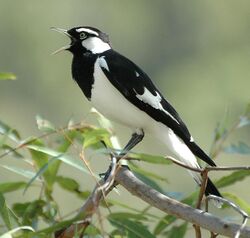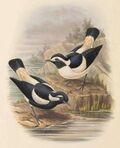Biology:Grallina
| Grallina | |
|---|---|

| |
| Male magpie-lark (Grallina cyanoleuca) | |
| Scientific classification | |
| Domain: | Eukaryota |
| Kingdom: | Animalia |
| Phylum: | Chordata |
| Class: | Aves |
| Order: | Passeriformes |
| Family: | Monarchidae |
| Genus: | Grallina Vieillot, 1816 |
| Type species | |
| Grallina melanoleuca[1] Vieillot, 1816
| |
| Species | |
|
See text | |
| Synonyms | |
| |
Grallina is a genus of passerine bird native to Australia and New Guinea. It is a member of a group of birds termed monarch flycatchers.
Taxonomy
Higher taxonomy
Long thought to be a member of the mudnest builder family Corcoracidae, the magpie-lark and torrent lark have been reclassified in the family Monarchidae (the monarch flycatchers). The two make up a lineage that split off early from other monarchs and has no close relatives within the family.[2]
The monarch flycatchers are considered either as a subfamily Monarchinae, together with the fantails as part of the drongo family Dicruridae,[3] or as a family Monarchidae in its own right.[4] More broadly, they belong to the Corvida parvorder comprising many tropical and Australian passerines including pardalotes, fairy-wrens and honeyeaters as well as crows.[5]
Species
Two species are recognized:[6]
| Image | Scientific name | Common Name | Distribution |
|---|---|---|---|
 |
Grallina cyanoleuca | Magpie-lark | Australia, Timor, and southern New Guinea |
 |
Grallina bruijnii | Torrent-lark | New Guinea |
References
- ↑ "Monarchidae". The Trust for Avian Systematics. https://www.aviansystematics.org/4th-edition-checklist?viewfamilies=150.
- ↑ Andersen, M.J.; Hosner, P.A.; Filardi, C.E.; Moyle, R.G. (2015). "Phylogeny of the monarch flycatchers reveals extensive paraphyly and novel relationships within a major Australo-Pacific radiation". Molecular Phylogenetics and Evolution 83: 118–36. doi:10.1016/j.ympev.2014.11.010. PMID 25463752.
- ↑ Christidis L, Boles WE (1994). The Taxonomy and Species of Birds of Australia and its Territories. Melbourne: RAOU.
- ↑ Christidis L, Boles WE (2008). Systematics and Taxonomy of Australian Birds. Canberra: CSIRO Publishing. pp. 174. ISBN 978-0-643-06511-6.
- ↑ Sibley, Charles Gald & Ahlquist, Jon Edward (1990): Phylogeny and classification of birds. Yale University Press, New Haven, Conn.
- ↑ "IOC World Bird List 6.4". IOC World Bird List Datasets. doi:10.14344/ioc.ml.6.4. http://www.worldbirdnames.org/ioc-lists/crossref.
Wikidata ☰ Q268410 entry
 |

